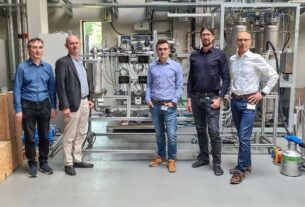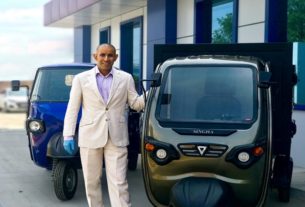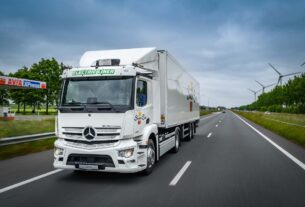By Anurag Garg, Managing Director & Country Head, Vitesco Technologies India
The automotive sector is currently undergoing what is arguably the biggest transformation in its entire history. The challenge is to achieve a dual technological transformation: from fossil fuels to renewably generated electricity, and from analog to digital technology.

At this same time, this year hit us with the worst ever pandemic crisis along with the global economy facing massive downtime. Nations around the globe have posed severe stringent restrictions ranging from days to months of lockdown periods. Many businesses are halted waiting for the market conditions to improve and some have already sunk under the unforeseen brunt of pandemic. But this time is also a boon to the industries which are looming over the silver lining this period of pandemic provides and even looking at this period as an opportunity. EV Industry projects to be one those and promises even better growth post this period.
Changes in consumer behavior and public transportation

Across the globe in many countries, the entire public transportation was halted due to increased risk of infection given the contagious nature of COVID 19. Now that the lockdown is lifted, many people are still avoiding the usage of these public mediums of transportation, including cabs, metro, and buses, as a precautionary measure. Since normalcy has been restored in cities, there are visible market reports confirming that 2 wheelers, private cars, walking, and biking have gained the most share since the pandemic began, while bus and metro ridership is declined heavily.
Given this future scenario, it foresees a promising picture for EV industry especially for the daily city commuters who travel shorter distances within the city such as people from service industries, homemakers, students etc. Being safer and more economical mode of transportation, the segment will gain traction in given days with enhanced demand. Looking at the current demand in the market, multiple 2-wheeler OEMs are moving even faster to gain on this movement.
Early on the consumers were a little worried about the charging stations in India, which was one of the biggest reasons why people were afraid of buying an EV. In this year we are expecting to see big changes such as the OEM providers are ready to help the consumers by installing a charging point at their home. This solution is likely to lower the concerns of the buyer of an electric vehicle. This is also a great way to promote electric vehicles. In the past years we have seen consumers being aware of the advantages that an electric vehicle provides to the environment, and they want to opt for an EV.
Better Solution to Fuel Crisis & Price Hikes

During the lockdown period, states were discouraging the general distribution of petrol and diesel to discourage city and cross state commutes. Given the high prices of fuel even today in the market, this further provides opportunities to the EV industry. While public is best advised to stay home and to opt for private vehicles for any sort of commute across the city, they can depend on electric mobility for cost efficient transportation without the added burden of petrol/diesel price hikes.
As more electric 2-wheelers enter the Indian market, it will provide a range of options to the customer, and help in optimising the cost as well.
Regulatory uncertainty could increase
As per a recent McKinsey report on future of mobility solutions post COVID 19. We believe that regulators will react differently across regions. Some might view the crisis as an inflection point to accelerate the transition toward sustainable mobility, while others could loosen regulatory mandates to prop up their ailing automotive industries. In some markets, potential support programs, including cash incentives for trading in old cars, could amplify the industry’s focus on sustainability and increase electric-vehicle (EV) sales above projections.
If physical distancing continues, city leaders might relax regulations for private mobility, at least over the short-term, because people feel less vulnerable to infection in individually owned vehicles. We assume that some of those measures might stay in place after the crisis. If they promote improvements, such as fewer accidents and less pollution, cities may decide to make them permanent. This would be a great opportunity for consumers to look into the electric vehicle option. The major concern that people feel with electric vehicles is charging stations for private vehicles, India is taking massive steps to resolve this issue by installing charging stations across the country.

EVs set to emerge stronger than ever
The Indian electric vehicle (EV) market will continue to be largely driven by the two-wheeler and three-wheeler segments as of now. As per EV market forecast by Frost and Sullivan, e-rickshaws, e-autos and e-two wheelers are the most promising segments for electrification in India and are expected to account for over four-million units by 2025. Additionally, we are also looking at cars to get either a hybrid engine or a fully electric car in the coming years. The government is making sure that the consumers know and understand the benefits of opting for an electric vehicle and how they are helping the environment and public health. The FAME-II scheme pushes people to purchase an electric vehicle. It will be started off in the commercial sector in the beginning and then people will be pushed further towards buying an EV. The government has also declared their intention to install at least 60,000 charging stations across the petrol pumps of the country.
The period post COVID 19 will serve as a perfect chance for EV brands to connect with their customers from these segments. A lot of top brands are using this time to get in touch with customers through digital mediums to improve loyalty and sustain brand awareness. Since e-commerce is on the rise, EV brands may also use this downtime to create a stronger online presence for more visibility. By making the most of on the opportunities, EV companies will be able to recuperate their impetus once the contagion is confined. They will be back in action on the road to EV uprising in the country.





